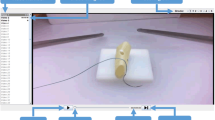Abstract
Background
Laparoscopic surgery requires a unique set of technical skills. More experienced laparoscopic surgeons perform certain tasks more efficiently in a video trainer than less experienced laparoscopic surgeons. The presumption is that the experienced surgeon possesses more of the skill required to complete the task. This study sought to determine the degree to which previous laparoscopic operative experience influenced the performance of selected video trainer tasks of varying complexity.
Methods
In this study, 19 general surgery residents with varying levels of laparoscopic operative case experience (as defined by operative case logs) were timed performing five tasks in a video trainer. The tasks were rope pass, peg drop, peg exchange, needle pass, and knot tie. All the residents watched a video demonstration of each skill before testing. None of the residents had previous exposure to video trainers, and no practice was allowed before testing. A composite score for all tasks was calculated for each resident as a measure of overall performance.
Results
There was a strong correlation between operative experience and time required for successful completion of each task, with the exception of the rope pass. The magnitude of correlation increased with tasks of increasing complexity. Composite scores were correlated with operative experience. Significant interval improvements in performance were observed for increasing experience up to a level of approximately 100 previous laparoscopic cases.
Conclusions
Overall composite scores and time required for the completion of each individual video trainer task (with the exception of the rope pass) may be an accurate reflection of laparoscopic surgical skill acquired in the operating room. A resident may need as many as 100 laparoscopic cases for full development of a basic skill set in the operating room. A more efficient and safe method of training, such as a validated skills curriculum conducted in a dry lab, is a desirable alternative to developing skill exclusively in the operating room.
Similar content being viewed by others
References
Derossis AM, Fried GM, Abrahamowicz M, Sigman HH, Barkun JS, Meakins JL (1998) Development of a model for training and evaluation of laparoscopic skills. Am J Surg 175: 482–487
Figert PL, Park AE, Witzke DB, Schwartz RW (2001) Transfer of training in acquiring laparoscopic skills. J Am Coll Surg 193: 533–537
Fraser SA, Klassen DR, Feldman LS, Ghitulescu GA, Stanbridge D, Fried GM (2003) Evaluating laparoscopic skills: setting the pass/fail score for the MISTELS system. Surg Endosc 17: 964–967
Fried GM, Derossis AM, Bothwell J, Sigman HH (1999) Comparison of laparoscopic performance in vivo with performance measured in a laparoscopic simulator. Surg Endosc 13: 1077–1082
Fried GM, Feldman LS, Vassiliou MC, Fraser SA, Stanbridge D, Ghitulescu G, Andrew CG (2004) Proving the value of simulation in laparoscopic surgery. Ann Surg 240: 518–528
Hamilton EC, Scott DJ, Kapoor A, Nwariaku F, Bergen PC, Rege RV, Tesfay ST, Jones DB (2001) Improving operative performance using a laparoscopic hernia simulator. Am J Surg 182: 725–728
Rosser JC, Rosser LE, Savalgi RS (1997) Skill acquisition and assessment for laparoscopic surgery. Arch Surg 132: 200–204
Scott DJ, Young WN, Tesfay ST, Frawley WH, Rege RV, Jones DB (2001) Laparoscopic skills training. Am J Surg 182: 137–142
Torkington J, Smith SGT, Rees BI, Darzi A (2001) The role of the basic surgical skills course in the acquisition and retention of laparoscopic skill. Surg Endosc 15: 1071–1075
Vassiliou MC, Feldman LS, Andrew CG, Bergman S, Leffondré K, Stanbridge D, Fried GM (2005) A global assessment tool for evaluation of intraoperative laparoscopic skills. Am J Surg 190: 107–113
Author information
Authors and Affiliations
Corresponding author
Rights and permissions
About this article
Cite this article
Black, M., Gould, J.C. Measuring laparoscopic operative skill in a video trainer. Surg Endosc 20, 1069–1071 (2006). https://doi.org/10.1007/s00464-005-0678-4
Received:
Accepted:
Published:
Issue Date:
DOI: https://doi.org/10.1007/s00464-005-0678-4




